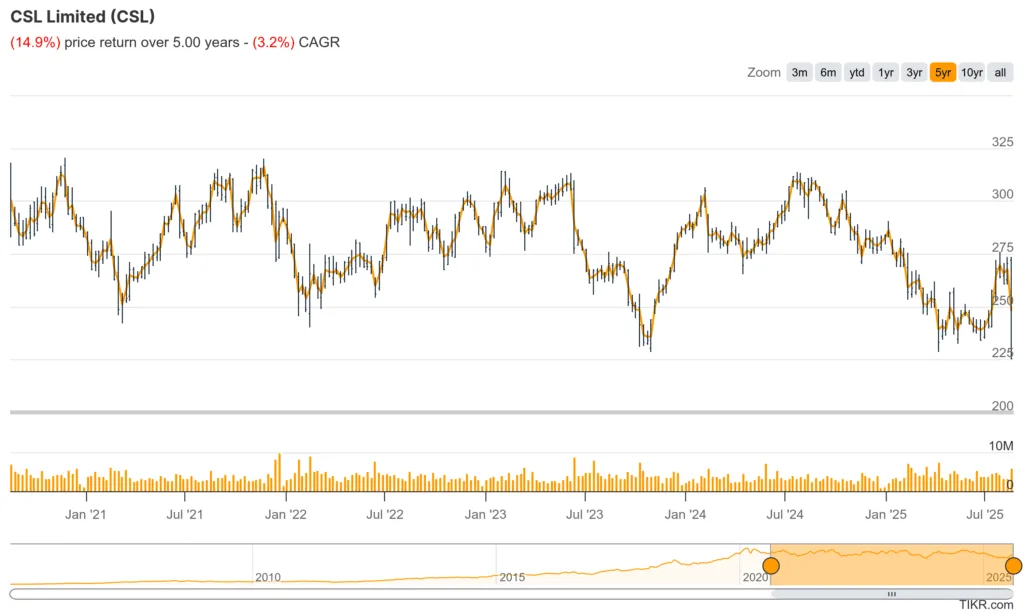What happened to the CSL share price?
A 15% fall in a single day. That’s what CSL Ltd (ASX:CSL), one of the biggest companies on the ASX, delivered after its FY25 results and transformation announcement. The numbers themselves looked solid: revenue up 5% to US$15.6 billion, NPAT up 17% to US$3.0 billion, and free cash flow up 58%. So why did the market hammer the stock?

What spooked investors
Two words: guidance and restructuring. Management forecast FY26 NPATA growth of 7–10% excluding restructuring, but flagged one-off pre-tax restructuring costs of US$700–770 million. These stem from headcount cuts (up to 15%), plasma centre closures, and a major shake-up of CSL’s R&D footprint.
On top of that, CSL announced plans to demerge CSL Seqirus by 2026, spinning out the influenza vaccines business as a separate ASX-listed company. While strategically sound, investors don’t like uncertainty — and splitting a $2.2b revenue division adds plenty.
CSLs impact on the index
The Vanguard Australian Shares ETF (ASX: VAS), which tracks the S&P/ASX 300 index declined 0.55% yesterday. This is despite the all four major banks being up by at least 0.5% and BHP Group Limited (ASX: BHP) being up over 1.5%.
CSL is the third largest position in the index at a weight of 4.8%.
Investing for teenagers
A Rask Invest investor recently asked me this fantastic question about investing for her teenage kids. The idea would be to get them interested in investing, hands on and taking over the portfolio at the age of 18.
I am doing something similar, but I’ve got a long way to go until my little fella turns 18. For this, I use Rask Invest’s Luna portfolio which we designed specifically for children. Luna is more about what it doesn’t do than what it does do. This is due to the tax consequences on income in a child’s name.
My fear of this boring, although effective, long-term approach though is it may not be engaging enough for a teenager. So, perhaps there’s a middle ground. Boring long-term index tracking ETFs coupled with a handful of businesses they interact with, with the ETFs doing the heavy lifting and the individual stocks there as a tuition fee.
An exercise I learnt from Tim Carleton, a recent Australian Investors Podcast guest is to simply get the kids to write down the types of businesses they’re most familiar with, ordering them from most familiar to least. Then start the research. You’ll be surprised just how many ASX and globally listed companies you’ll come across when you go to a large shopping centre.
Companies like Lovisa, JB Hifi, Accent Group (think Hype DC Shoes etc), Cobram Olive Oil, A2 Milk, Super Retail Group (think Rebel Sport, BCF) are all ASX listed companies. I even walked past a BYD car stand in the middle of Chadstone last time I was there. Once you start seeing listed companies around you, you can’t stop noticing them.
Just one thing to note though, before getting started just have a word with your accountant re setting up any investment or brokerage account for your kids. Here’s a guide we put together on investing for kids.
US markets overnight
Tech stocks, led by NVIDIA Corp (NASDAQ: NVDA) drove the US markets down overnight, evident with the greater decline in the tech-heavy Nasdaq. It wasn’t all bad news though.
In a nod to the resilience of the US consumer, Home Depot Inc (NYSE: HD) shares rose over 3% as American’s fixed up the house and got out in the backyard. Home Depot’s result was in line with expectations and was a 4.9% increase on the prior year.
- S&P 500 = -0.59%
- Nasdaq = -1.46%
- Aussie dollar down 0.6% to 64.52 US cents
- Iron down 0.2% to $101.20 US a tonne
If you would like more insight from myself and the Rask team jump across to Rask Core. Rask Core is where you will find more of my write ups and our ETF model portfolios. Rask Core is our “do it with me” service. You can control your own investments but do so with confidence as you see the exact holdings and percentages. Check it out here.









